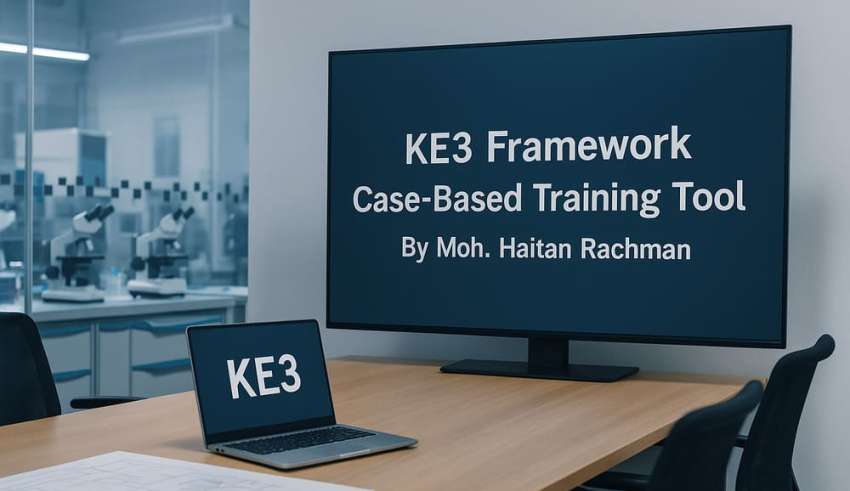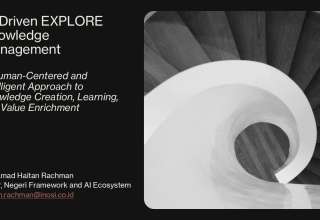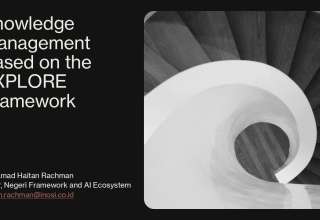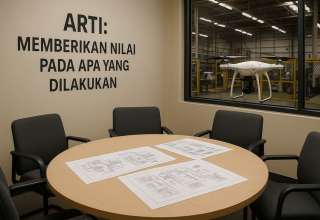
*) Gambar sebagai ilustrasi
KE3 Framework Case-Based Training Tool
For Research, Education, and Innovation Applications
By: [Mohamad Haitan Rachman, INOSI]
OVERVIEW
This training tool helps learners and practitioners apply the KE3 Framework (Knowledge Exploration, Enrichment, Exploitation) through realistic case-based scenarios. Each case is structured into three KE3 stages and designed to build skills in inquiry, depth, and application.
Case 1: Education Technology in Remote Areas
Scenario: A non-profit education organization is looking to improve learning outcomes in rural schools through digital solutions.
KE3 Application:
- Exploration: Explore the key challenges faced by rural schools in adopting educational technology.
- Enrichment: Compare the digital education strategies used in remote areas of Indonesia, India, and Kenya.
- Exploitation: Design a pilot program using mobile learning for off-grid communities.
Prompt Template:
Explore digital learning barriers in rural Southeast Asia. Enrich this by comparing cross-country education tech initiatives. Exploit these insights to build a proposal for an offline-capable learning platform.
Case 2: Climate-Smart Agriculture Innovation
Scenario: A startup is developing an AI-powered tool for climate-resilient farming practices.
KE3 Application:
- Exploration: Explore how climate change is affecting small-scale farmers in tropical regions.
- Enrichment: Enrich the topic by integrating traditional knowledge with modern agri-tech solutions.
- Exploitation: Develop a product roadmap for a smart assistant app for local farmers.
Prompt Template:
Explore the impact of unpredictable weather on farming yields. Enrich this by integrating indigenous knowledge and AI. Exploit the findings to draft a smart assistant concept for smallholder farms.
Case 3: Knowledge Commercialization in Universities
Scenario: A research university wants to turn academic knowledge into commercial solutions for the health sector.
KE3 Application:
- Exploration: Explore the barriers that prevent university research from reaching the marketplace.
- Enrichment: Analyze best practices from top academic innovation hubs globally.
- Exploitation: Design a commercialization workflow for health research projects.
Prompt Template:
Explore the institutional and policy barriers to commercializing university research. Enrich with case studies from MIT, NUS, and TU Delft. Exploit these insights to build a commercialization guide tailored for medical researchers.
Case 4: Sustainable Tourism Development
Scenario: A local government in a coastal region is seeking strategies to promote sustainable tourism without harming the environment.
KE3 Application:
- Exploration: Explore the environmental pressures caused by mass tourism in coastal areas.
- Enrichment: Compare sustainable tourism strategies from Bali, Costa Rica, and the Maldives.
- Exploitation: Create a policy proposal balancing ecological preservation and community-based tourism.
Prompt Template:
Explore the environmental impact of tourism in coastal zones. Enrich this with successful case studies in eco-tourism. Exploit findings to write a sustainable tourism policy draft for local governments.
Case 5: AI for Mental Health in Schools
Scenario: A mental health NGO wants to use AI to detect early signs of stress among students.
KE3 Application:
- Exploration: Explore the signs and causes of rising anxiety among high school students.
- Enrichment: Integrate findings from psychology, education, and data ethics.
- Exploitation: Propose an AI-based tool for school counselors with ethical safeguards.
Prompt Template:
Explore current mental health challenges among teens. Enrich with perspectives from psychology and AI ethics. Exploit these insights to design a responsible early-alert system for schools.
Training Instructions
- Choose a case or create your own.
- Work through each KE3 stage deliberately.
- Use prompts or rewrite your own.
- Encourage group discussion or peer review.
- Document insights using the KE3 Canvas or journal.
- Present results as a pitch, prototype, or policy brief.
If you have questions related to the development of solutions and the ChatGPT training we provide and wish to cooperate, please contact us at haitan.rachman@inosi.co.id.







